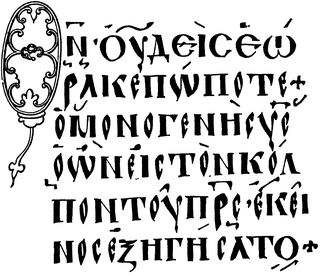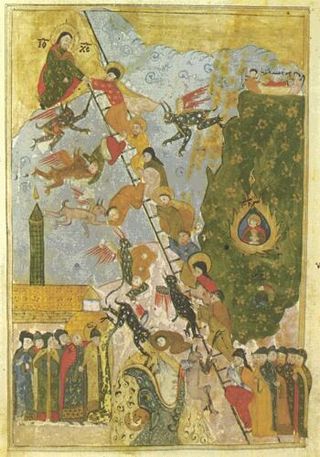Related Research Articles

Matthew 12:39 is the 39th verse in the twelfth chapter of the Gospel of Matthew in the New Testament.
Whoever welcomes a prophet as a prophet will receive a prophet’s reward, and whoever welcomes a righteous person as a righteous person will receive a righteous person’s reward.
Matthew 11:23 is the 23rd verse in the eleventh chapter of the Gospel of Matthew in the New Testament.

Matthew 8:27 is a verse in the eighth chapter of the Gospel of Matthew in the New Testament.
Matthew 12:28 is the 28th verse in the twelfth chapter of the Gospel of Matthew in the New Testament.

Matthew 14:28 is a verse in the fourteenth chapter of the Gospel of Matthew in the New Testament.

The Benedictus, given in Gospel of Luke 1:68–79, is one of the three canticles in the first two chapters of this Gospel, the other two being the "Magnificat" and the "Nunc dimittis". The Benedictus was the song of thanksgiving uttered by Zechariah on the occasion of the circumcision of his son, John the Baptist.
In Mormonism, revelation is communication from God to man. Latter Day Saints teach that the Latter Day Saint movement began with a revelation from God, which began a process of restoring the gospel of Jesus Christ to the earth. Latter Day Saints also teach that revelation is the foundation of the church established by Jesus Christ and that it remains an essential element of his true church today. Continuous revelation provides individual Latter Day Saints with a "testimony", described by Richard Bushman as "one of the most potent words in the Mormon lexicon".

John 1:19 is the nineteenth verse in the first chapter of the Gospel of John in the New Testament of the Christian Bible.

John 1:20 is the twentieth verse in the first chapter of the Gospel of John in the New Testament of the Christian Bible.

John 1:25 is the twenty-fifth verse in the first chapter of the Gospel of John in the New Testament of the Christian Bible.

John 1:42 is the 42nd verse in the first chapter of the Gospel of John in the New Testament of the Christian Bible.

John 1:45 is the 45th verse in the first chapter of the Gospel of John in the New Testament of the Christian Bible.

John 1:46 is the 46th verse in the first chapter of the Gospel of John in the New Testament of the Christian Bible.

John 1:48 is a verse in the first chapter of the Gospel of John in the New Testament.

John 1:49 is a verse in the first chapter of the Gospel of John in the New Testament.

John 1:51 is the 51st verse in the first chapter of the Gospel of John in the New Testament.

Matthew 11:2–3 are the second and third verses in the eleventh chapter of the Gospel of Matthew in the New Testament.
Matthew 11:4-6 is a set of verses in the eleventh chapter of the Gospel of Matthew in the New Testament.
Matthew 12:17-18 are two verses in the twelfth chapter of the Gospel of Matthew in the New Testament.
References
- ↑ John MacEvilly, An Exposition of the Gospel of St. John consisting of an analysis of each chapter and of a Commentary critical, exegetical, doctrinal and moral, Dublin Gill & Son 1879.
- ↑ Cornelius Cornelii a Lapide; Thomas Wimberly Mossman The great commentary of Cornelius à Lapide, London: J. Hodges, 1889-1896.
- 1 2 3 4 5 6 "Catena aurea: commentary on the four Gospels, collected out of the works of the Fathers: Volume 6, St. John. Oxford: Parker, 1874. Thomas Aquinas".
 This article incorporates text from this source, which is in the public domain .
This article incorporates text from this source, which is in the public domain .